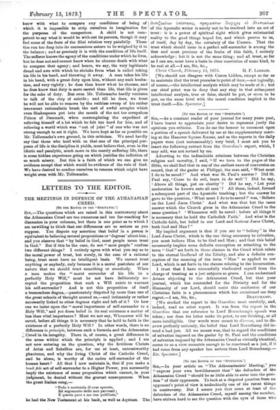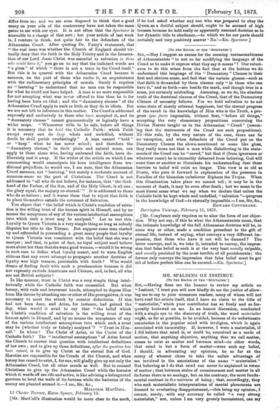[TO THE EDITOR OF TILE " SPECTATOR-1
Sue,—In your article on "The Athanasianists' Meeting," you "express your own bewilderment that" the defenders of the Athanasian Creed "should be so little able to enter into the posi- tion" of their opponents. To look at a disputed question from an opponent's point of view is undoubtedly one of the rarest things in controversy. But I assure you that some at least of the defenders of the Athanasian Creed, myself among the number, have striven hard to see the question with the eyes of those who
is I venture to think, not quite fair to the defenders of the certainly, and very positively answer Spectator.] Athanasian Creed. After quoting Dr. Pusey's statement, that "the real issue was whether the Church of England should vir- [TO THE EDITOR OF THE " SPEOTATOR.1 tually deny that the faith in the Holy Trinity and in the Incarna- Sin,—May I suggest an excuse for the seeming unreasonableness tion of our Lord Jesus Christ was essential to salvation in those of Athanasianista "in not so far modifying the language of the who could have it," you go on to say that the italicised words are Creed as to make it express what they say it means"? Our reluct- " a glow; " of which "there is not a trace in the Creed itself." ance to do this arises from the fact that at the bottom we do But this is to quarrel with the Athanasian Creed because it understand this language of the " Damnatory " Clauses in their assumes, on the part of those who recite it, an acquaintance first and obvious sense, and feel that the various glosses—such as with the rudimentary principles of morals. Surely it requires that faithkiii demanded by these clauses only "in those who can no " learning " to understand that no man can be responsible ' have it," and so forth—are beside the mark, and though true in a for what he could not have helped. A man is no more responsible sense, yet certainly misleading. Assuming, as we do, the absolute for not accepting what was never offered to him than he is for truth of the doctrinal clauses of the Creed, that of the Damnatory having been born an idiot ; and the " damnatory clauses" of the Chases of necessity follows. For we hold salvation to be not Athanasian Creed apply to such as little as they do to idiots. But shine state of Merely external happiness, but the eternal progress we are not left to inference in this matter. The Creed is addressed of the saved in the knowledge of Him who is the Truth, a pro- expressly and exclusively to those who have accepted it, and its grass ipso facto impossible, without first, "before all things," " damnatoiy clauses" cannot grammatically or logically have a accepting the very elementary propositions concerning the wider scope. "'Whosoever wills to be safe, before all things Divine Nature taught us in the Athanasian " Creed " (assum- it is necessary that he hold the Catholic Faith : which Faith ring that the statements of the Creed are such propositions). except every one do keep whole and undefiled, without T5 :this rule, by the very nature of the case, there can be doubt he shall perish everhil'itingly." A man cannot " hold " no 'exception, and when defenders of the Creed put on the or " keep " what he has never seized; and therefore the Danthatory Clauses the above-mentioned or some like gloss, " damnatory clauses," in their plain and natural sense, can they really mean not that a man while disbelieving in the state- apply to those alone who, having embraced the faith, have de- menteof the Creed can be "saved," but that if (from ignorance or liberately cast it away. If the writer of the article on which I am whatever cause) he is excusably debarred from believing, God will commenting would emancipate his keen intelligence from tra- some time or another so illuminate his understanding that these ditional prejudices, he would see, I am sure, that the Athanasian barriers to belief will exist no longer. This view is as old as Creed assumes, not "learning," but merely a Moderate amount of Dante, who puts it forward in explanation of the presence in common-sense on the part of Christians. The Creed is not Paradise of the blameless unbeliever Riphaus the Trojan. When addressed to "all who do not believe, for instance, that the God- this illumination takes place we cannot tell ; it may be in the head of the Father, of the Son, and of the_Haly Ghost, is all one ; moment of death, it may be even after death ; but we mean in the the glory equal, the majesty co-eternal.'" .,it is addressed to those most literal sense what we say when we declare that unless the who do so believe ; and it warns them that to reject that faith is Catholic faith be kept whole and undefiled, "salvation "—progress
to place themselves outside the covenant of Salvation, in the knowledge of God—is eternally impossible.—I am, Sir, &c., You object that "the belief which is Christ's condition of salva- tion is the willing trust of the human spirit in Himself, and by no means the acceptance of any of the various intellectual assumptions into which such a trust may be analysed." Let us test this. Loyalty to Queen Victoria is a very simple thing so long as nobody disputes her title to the Throne. But suppose some man started up and sifcceeded in persuading a great many people that loyalty to Queen Victoria was consistent with the belief that she was a usurper ; and that, in point of fact, no loyal subject need believe more about her than thatshe3vas a good woman,—would it be wrong in such case to define what loyalty meant, and to warn English
[Mr. Conybeare only requires us to alter the form of our objec- tion. Why not say, if this be what the Athanasianists mean, that the intimate knowledge of the full Athanasian doctrine will be, in some way or other, made a condition precedent to the gift of eternal life, instead of saying, what conveys a very different im- pression, that those who have it not will be damned ? The letter conveys, and is, we take it, intended to convey, the impres- sion that false belief as such is at the very least usually culpable, and usually punished by the most terrible of all punishments ; the citizens that any overt attempt to propagate another doctrine of former only conveys the impression that false belief must be got loyalty was high treason, punishable with death ? Who would rid of before perfect bliss can be secured.—En. Spectator.]
dream of finding fault with such a proclamation because it did not expressly exclude Americans and Chinese, and, in fact, all who are not British subjects ? MR. SPALDING ON INSTINCT.
In like manner, trust in Christ was a very simple thing intel- [TO THE EDITOR OF THE "SPECTATOR."] lectually while the Catholic faith was unassailed. But when Sfit,—Having done me the honour to review my article on heresy, with rude and irreverent hands, attempted to depose Him "Instinct," I trust you will now kindly do me the justice of allow- from His throne by attacking one or other of His prerogatives, it was ing me to say to your numerous readers, many of whom will not necessary to meet the attack by counter definitions. If this have read the article itself, that I have no claim to the title of had not been dene, and Anus, for instance, had gained the "materialist," which your contributor has so freely and so fre- day, what would it avail to say that "the belief which quently bestowed on ma. In an honest discussion, conducted is Christ's condition of salvation is the willing trust of the with, a single eye to the discovery of truth, the word materialist human spirit in Himself, and by no means the acceptance of any ought, as far as possible, to be avoided, because of its unfortunate of the various intellectual assumptions into which such a trust association in the popular mind with irreligion, which is again may be (whether truly or falsely) analysed "? "Trust in Him- associated with immorality. if, however, I were a materialist, if self." In whom? The Christ of Arius, or the Christ of the Catholic faith? The "intellectual assumptions" of Arius forced the Church to answer that question with intellectual definitions of her own ; and to give up those definitions, after the question has been raised, is to give up Christ as the eternal Son of God. Heretics are responsible for the Creeds of the Church, and when heresy has ceased to exist, I, for one, will gladly give up not only the Athanasian Creed, but all other creeds as well. But to counsel Christians to give up the Athanasian Creed while the heresies which it wards off are rife and active, is like advising a beleaguered garrison to level the walls of its fortress while the batteries of the enemy are planted around it.—I am, Sir, &c.,
MALCOLM MACCOLL.
12 Chester Terrace, Eaton Square, February 13.
[Mr. MacColl's illustration would be more close to the mark,
differ from us ; and we are even disposed to think that a good if he had asked whether any one who was ,prepared to obey the manynn your side of the controversy have not taken the same Quemas a dutiful subject should, ought to be accused of high pains to see with our eyes. It is not often that the Spectator is ' treason.because he held really or apparently unsound doctrine as to amenable to a charge of that sort ; but your article of last week her dynastic title to obedience,—to which we for our parts should



































 Previous page
Previous page